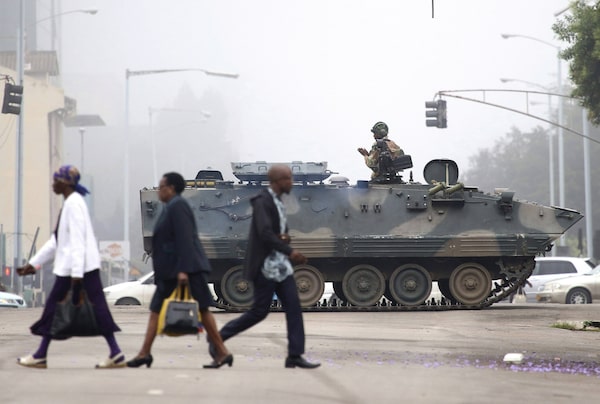
An armed soldier patrols a street in Harare, Zimbabwe, Wednesday, Nov. 15, 2017.The Associated Press
The Globe and Mail's Geoffrey York is Canada's only full-time Africa correspondent. Follow him live on Twitter as he covers the ongoing crisis in Zimbabwe, and click here for York's full reporting on the continent.
Zimbabwe's army said Wednesday it has President Robert Mugabe and his wife in custody following a night of unrest that included a military takeover of the state broadcaster, a move that puts Mugabe's future in doubt.
Military vehicles moved into the streets of Harare on Tuesday night and had control of key points in the Zimbabwean capital by Wednesday morning.
It was the culmination of a power struggle in the ruling ZANU-PF party, in which senior military officials and politicians had been battling with a faction led by Mr. Mugabe's wife, Grace. The feud was worsened by a crumbling economy and by an internal battle over who will succeed the 93-year-old President when he dies or steps down.
What just happened in Zimbabwe? How a political crisis became a military takeover
Read also: Grace Mugabe's recklessness may spark a deadly presidential succession
Several cabinet ministers and other political allies of Grace Mugabe were among those reported to be arrested on Wednesday, although the reports were unconfirmed.
Armed soldiers in armoured personnel carriers stationed themselves at key points in Harare, while Zimbabweans formed long lines at banks in order to draw the limited cash available, a routine chore in the country's ongoing financial crisis. People looked at their phones to read about the army takeover and others went to work or to shops.
The night's action triggered speculation of a coup, but the military's supporters praised it as a "bloodless correction."
Major General Sibusiso Moyo, a senior military official, gave a televised address to the nation in full uniform from a studio at the state broadcaster. He said Mr. Mugabe and his family were "safe and sound" and their security was guaranteed.
"We are only targeting criminals around him who are committing crimes that are causing social and economic suffering in the country, in order to bring them to justice," he said.
"As soon as we have accomplished our mission, we expect that the situation will return to normalcy."
Canadians in Zimbabwe's capital were being advised Wednesday to stay indoors. In a message posted on its website, Global Affairs Canada said the "situation is tense" and advised Canadians there to "remain indoors and monitor the media."
South Africa's President Jacob Zuma spoke to Mr. Mugabe on Wednesday, and Mugabe told Zuma that he was confined to his home but that he was fine, the South African presidency said in a statement.
The president added that Mr. Zuma, in his capacity as chair of the Southern African Development Community, was sending special envoys to Zimbabwe to meet with Mr. Mugabe and the Zimbabwean Defence Force.
Mr. Moyo denied that it was a military coup. "What the Zimbabwe Defence Forces is actually doing is to pacify a degenerating political, social and economic situation in our country, which if not address may result in a violent conflict."
The military action was the climax of a long feud between senior military officers loyal to former vice-president Emmerson Mnangagwa and a faction led by Mr. Mugabe's controversial and unpopular wife.
Last week, Mr. Mugabe abruptly fired Mr. Mnangagwa, who had been the target of weeks of furious verbal attacks by Mrs. Mugabe. Senior military officials are close supporters of Mr. Mnangagwa and were angered by the sacking of the vice-president.
The army commander, General Constantino Chiwenga, had warned on Monday that the military was prepared to intervene. But an official statement from the ruling party on Tuesday accused him of insurrection and "treasonable conduct."
Overnight, at least three explosions were heard in Harare, and military vehicles were seen in the streets.
The U.S. Embassy closed to the public Wednesday and encouraged citizens to shelter in place, citing "the ongoing political uncertainty through the night." The British Embassy issued a similar warning, citing "reports of unusual military activity."
Aggressive soldiers told passing cars to keep moving through the darkness. "Don't try anything funny. Just go," one barked at Reuters on Harare Drive.
Mr. Zuma - speaking on behalf of the Southern African Development Community (SADC) - expressed hope there would be no unconstitutional changes of government in Zimbabwe as that would be contrary to both SADC and African Union positions.
Zuma urged Zimbabwe's government and the military "to resolve the political impasse amicably."
With files from Reuters, The Associated Press and The Canadian Press
 Geoffrey York
Geoffrey York